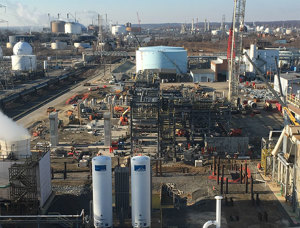Winter storm challenges US East Coast energy complex
NEW YORK (Reuters) — The US energy industry is facing a massive test of its infrastructure as an intense winter storm roars up the Atlantic Coast, threatening power outages, refinery shutdowns and spikes in heating prices.
The storm swept up the US Southeast toward New England on Wednesday, bringing snow, freezing rain and strong winds to a record-shattering cold already affecting much of the eastern United States. Temperatures are expected to keep dropping throughout the weekend, according to AccuWeather forecasts.
Prices for heating oil and natural gas in the US Northeast are at their highest levels in several years on the back of near-record heating demand.
The extreme cold has stoked fears that a significant disruption could lead to a heating oil shortage, as inventories of distillate products, including heating oil, in the New England and Mid-Atlantic regions are at their lowest levels for this time of year since 2015. A number of tankers carrying diesel and heating oil from Europe are bound for the United States to address supply worries.
The US Coast Guard in the key ports of Boston, the New York Harbor and Philadelphia have deployed ice-breaking ships to help keep trade traffic moving, but delays are expected.
Gasoline and diesel futures have climbed above five-year highs for this time of year, boosting key refining margins to a 5-yr high.
“I think we’ll see a big bang and price response but I don’t expect the impact and price response to be as long lasting as what you saw during Hurricane Harvey. Markets tend to over react,” said John Auers, executive vice president at consultancy Turner, Mason & Co. in Dallas.
Refiners along the US East Coast were bracing for difficulties in the next few days. So far, the five refineries along the East Coast are dealing with frozen pipes and other challenges, but have not experienced any significant outages, according to sources at the plants.
"We've had a lot of freeze up but haven't lost any units. This weekend will be bad," said a source at Monroe Energy's 185,000-bpd refinery outside Philadelphia.
Monroe Energy did not immediately respond to a request for comment.
Although most refineries, particularly those in northern climates, are designed to operate throughout the winter, increasingly extreme weather conditions in recent years have tested their capabilities. In 2015, more than a third of the US East Coast’s capacity was abruptly shut down due to glitches.
Philadelphia Energy Solutions delayed a planned shutdown of 50,000 bpd hydrotreater and a benzene unit at the Girard Point section of the Philadelphia refinery complex due to severe weather conditions, a source told Reuters Wednesday.
US natural gas demand was expected to remain near record highs this week due to the frigid weather. Natural gas is the major fuel for residential and commercial heating in the US Northeast and is also widely used by power plants.
Total gas consumption in the lower 48 US states peaked at 141.9 Bcfd on Monday, New Year's Day, and was expected to remain near that level all week, according to Thomson Reuters analysts.
One Bcfd of gas is enough to fuel about 5 MM US homes.
Natural gas prices in New England last week jumped to $53.50/MMBtu, highest since January 2014. The average price for gas in New England in 2017 was $3.80/MMBtu.
Reporting by Jarrett Renshaw, Jessica Resnick-Ault and Scott DiSavino; Editing by Alistair Bell







Comments